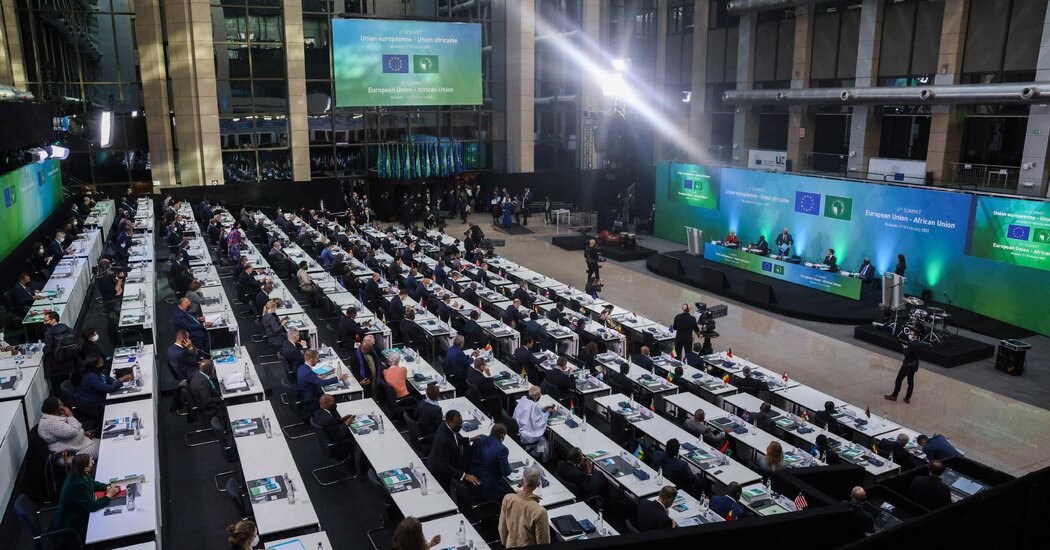
BRUSSELS — European officials knew the European Union wasn’t a household name in Africa, but it was only after they commissioned an in-depth poll that they learned the bloc was at best an afterthought, while China and the United States were cited as top partners.
To start fixing that, they started a glossy multimillion-euro advertising campaign in several African countries touting how ordinary young Africans have benefited from E.U. largess.
At meetings in Brussels on Thursday and Friday, the leaders of the 27 E.U. nations are rolling out the red carpet for 40 of their 55 African Union counterparts, at a big summit — their sixth — that Europeans hope will support the message that the relationship between the two continents is now a partnership of equals.
Less discussed, but impossible to ignore, are the obstacles in that relationship.
The biggest are the European Union’s razor-sharp focus on stopping Africans from migrating to Europe and its reluctance to support African demands for the release of vaccine patents to fight the spread of Covid-19, while pledges of new investment are vague and aspirational.
A draft joint declaration by the African Union and European Union, which was seen by The New York Times, shows in edit trace where each delegation changed the proposed wording, highlighting exactly where the fault lines lie.
The draft document shows that African Union members want the joint declaration to register their support to waive patents on Covid-19 vaccines, which African leaders would prefer to make for themselves. The European Union, which has long rejected these calls, proposes they settle for more anodyne language — to “commit to engage constructively toward a comprehensive response on trade and health.”
The European Union has so far donated 148 million vaccine doses to African countries and promises to reach 450 million by the summer of this year. Some investment in African vaccine manufacturing is slowly taking shape, but it will be years before it can deliver.
In the meantime, most E.U. citizens are on their third vaccine dose, while fewer than 10 percent of Africans are fully vaccinated.
Still, the European Union is attempting a hearts-and-minds campaign in Africa. The bloc is painfully aware that, despite being Africa’s top trading partner (more than a quarter of Africa’s exports and imports were with the bloc in 2020), few in Africa count it as an important interlocutor.
The European Commission, the bloc’s executive branch, hired Kantar, a major branding firm, to gather data on the question and was dismayed when its polling showed that Africans cite China, the United States and, lower down, France, as top partners.
The realization, officials said, led the European Commission to contract Ogilvy, a global advertising giant, for a 6.5 million euro ($7.4 million) campaign to raise awareness on what the E.U. does for Africans.
The glossy campaign, which included videos mostly promoted on social media, as well as billboards, featured E.U. funding recipients in seven nations and promoted the message that they were thriving at home.
Another five African countries will be featured this year in a new installment of the campaign, presented under the heading of “Africa and the European Union: Together. Tomorrow. Today.”
The unmistakable subtext of the campaign was that there was no need to migrate to Europe. Migration, in fact, is the hardest aspect of the relationship to look past when trying to reboot it as an equal partnership.
“Every cent that is being spent in Africa has to be linked with migration,” said Mehari Taddele Maru of the European University Institute in Florence, who served as the African Union’s Migration program director in the late 2000s.
He said that after the 2015 arrival of nearly a million Syrian refugees and the profound impact that had on European politics by bolstering far-right parties, the Africa-Europe relationship became largely defined by efforts to “contain Africans in Africa.”
“Almost all instruments of the E.U. became subservient to the migration agenda,” he added.
Nick Westcott, a former top British and European Union diplomat who is now director of the Royal African Society, said that the European Union has fallen short of its promises to African countries in the field of migration.
Both sides had agreed previously, at a summit in 2015, to stop smugglers, invest more to improve conditions in Africa, and to offer legal routes for immigration.
“The African Union and the European Union signed up to it,” Mr. Westcott, who at the time of the 2015 summit was the E.U.’s foreign service Africa chief. “The European Union has not fully delivered on its side of the bargain,” he added.
The bloc has become increasingly brutal in stopping African asylum seekers and economic migrants from reaching its shores, and thousands of Africans die each year trying, or disappear in Libya while waiting to attempt the desperate central Mediterranean crossing.
The European Union has not only failed to open meaningful pathways to legal migration for African laborers and highly skilled workers, but it’s now considering deploying border guards and drones in Africa to stop people from leaving.
Migrant workers’ remittances are vital to African economies, and African leaders would like to see those addressed in Brussels; the draft document seen by the Times indicated that the European Union delegation deleted that part from their joint declaration.
In fact, the topic of migration was formally downgraded at the summit, featuring only tangentially on the agenda, but for some European leaders, it was the priority.
The Coronavirus Pandemic: Key Things to Know
“Prosperity and peace in Africa are also our tasks,” said Prime Minister Mateusz Morawiecki of Poland on his way into the summit with African leaders. “We know perfectly well that one after another, migration waves have been destabilizing Europe since 2015.”
“Creating opportunities for young people, so numerous in Africa, is a guarantee for a stable Europe for decades to come,” he added.
Still, the presence of 40 out of the 55 African Union leaders in Brussels on Thursday shows the link between the two blocs is important, if difficult, Mr. Westcott said. “There is a vast amount of substance in the relationship,” he added.
The European Union is trying to place emphasis on investment and financial links between the two continents. The Netherlands, which is chairing the private-sector round-table talks at the summit, is one example of an E.U. member state that has supported its private sector in investing in Africa, especially in the field of renewable energy.
“This is where there’s a win-win opportunity for Europe because they can make a big impact and develop a positive relationship that’s consistent with European standards and priorities,” said Prof. Michael Tanchum, an associate senior policy fellow in the Africa program of the European Council for Foreign Relations.
At the summit, the European Union will announce it’s putting 150 billion euros, $170 billion, of investments in Africa on the table for the next few years, a dizzying figure that dwarfs China’s flagship Belt and Road Africa investments.
But pressed for details on how this figure breaks down and whether it corresponds to cash or hoped-for private-sector co-investments and leveraged loans and grants, it became evident the figure was aspirational.
One senior E.U. official briefing the press on condition of anonymity referred to the breakdown of the 150 billion headline figure as “magical engineering.”
Still, it may be that the economy is where African countries have the most power vis-a-vis European investors, courted as they are by China, Russia, the United States and an array of Middle Eastern powers.
“Ultimately it’s good for Africans to have options,” Professor Tanchum said. “Europe is realizing it has to bring its best game to Africa. The proof is in the doing.”



